Analysis of Sustainability Factors and Profitability in Hospitality
VerifiedAdded on 2023/01/24
|12
|3520
|22
Report
AI Summary
This report delves into the critical importance of sustainability within the hospitality industry. It examines the various facets of sustainability, including environmental, economic, and social issues, and assesses their impact on the profitability and overall operational efficiency of the sector. The report explores the contribution of the hospitality industry to environmental concerns such as carbon emissions and resource wastage, while also analyzing the industry's influence on social aspects like employment rates and cultural differences. Furthermore, it investigates how these issues affect the financial performance of hospitality businesses, with a focus on strategies to mitigate negative impacts and enhance long-term sustainability. The report also highlights the significance of corporate sustainability management and its role in fostering customer loyalty and responsible business practices, emphasizing the need for environmental consciousness and ethical operations to ensure the industry's continued success.
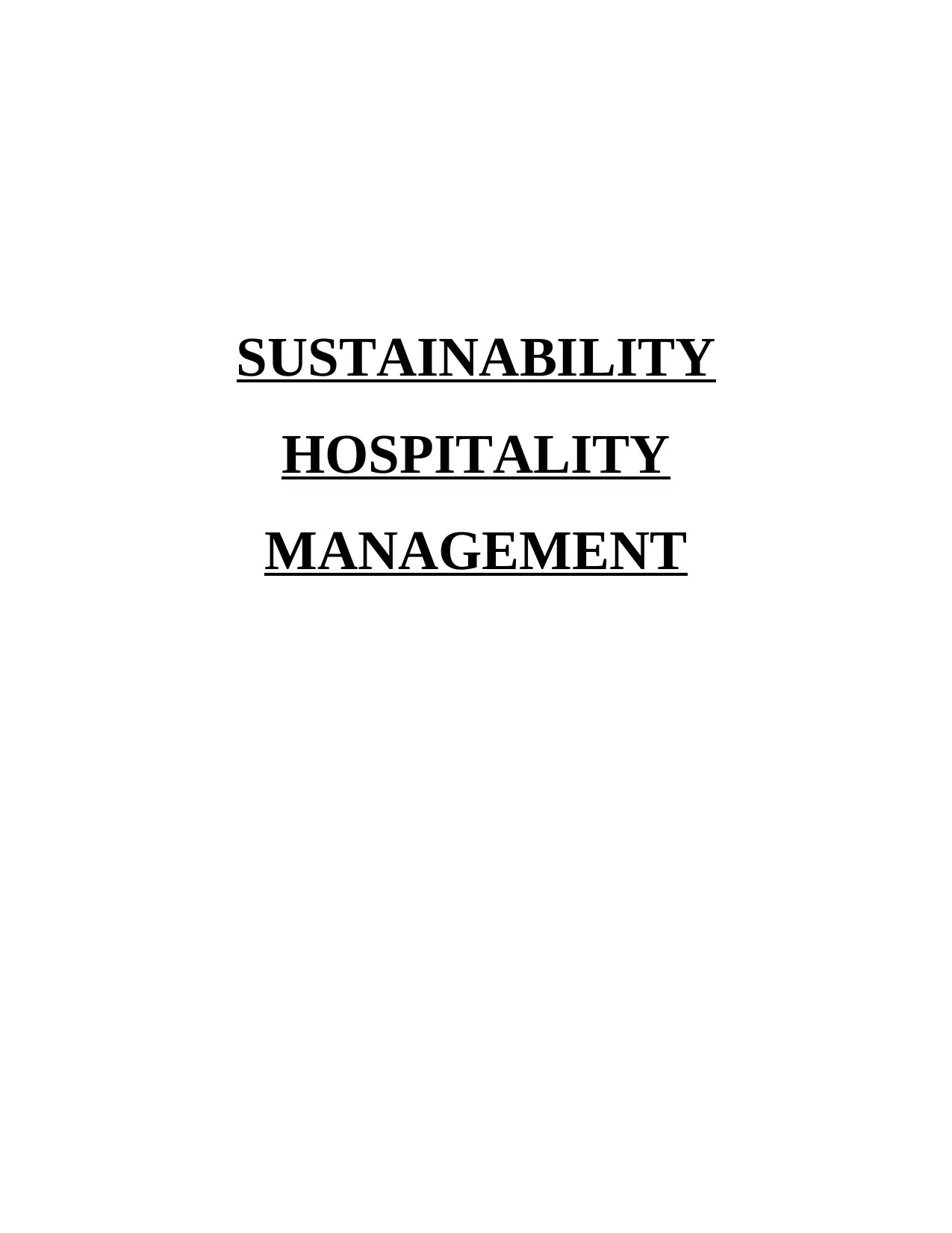
SUSTAINABILITY
HOSPITALITY
MANAGEMENT
HOSPITALITY
MANAGEMENT
Paraphrase This Document
Need a fresh take? Get an instant paraphrase of this document with our AI Paraphraser
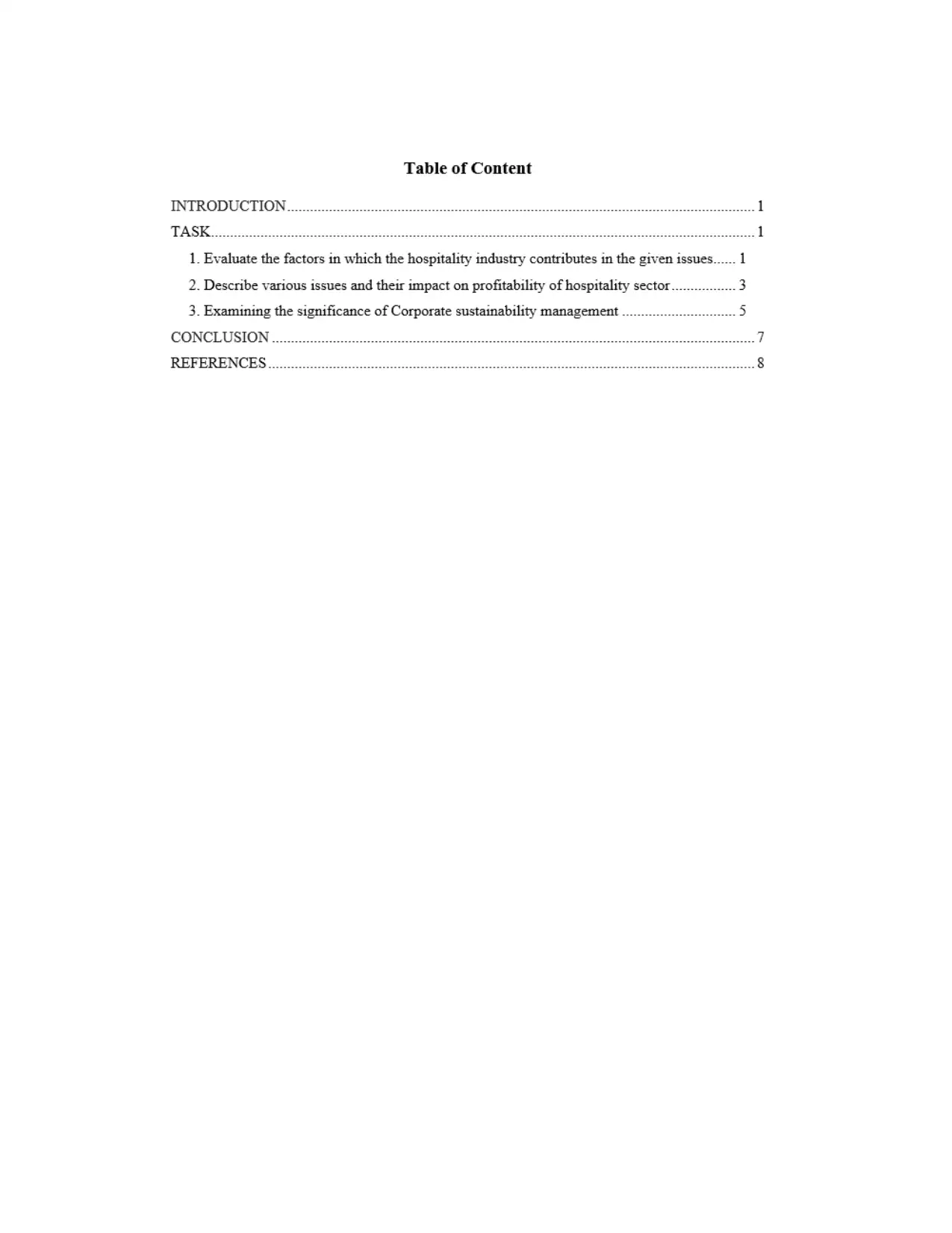
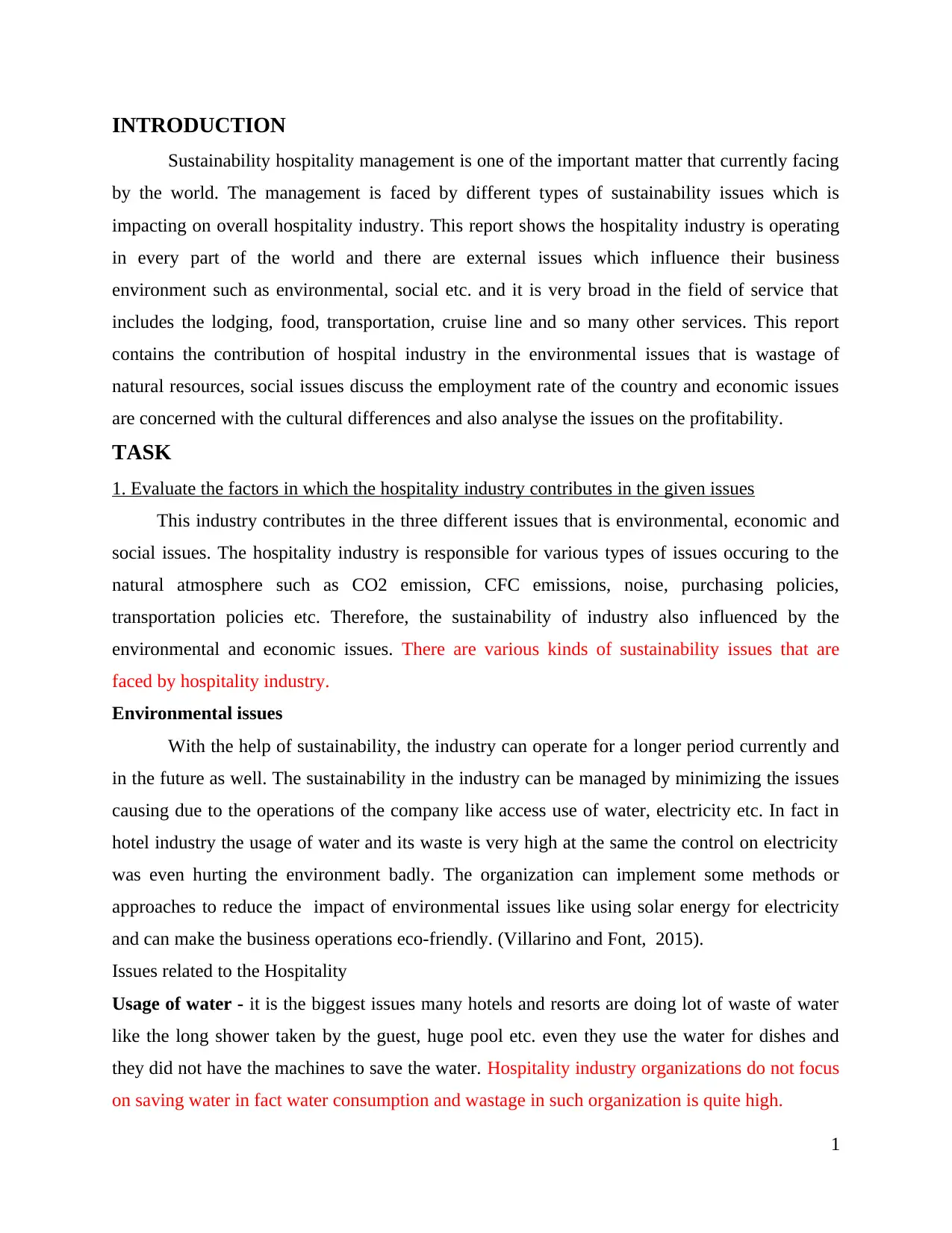
INTRODUCTION
Sustainability hospitality management is one of the important matter that currently facing
by the world. The management is faced by different types of sustainability issues which is
impacting on overall hospitality industry. This report shows the hospitality industry is operating
in every part of the world and there are external issues which influence their business
environment such as environmental, social etc. and it is very broad in the field of service that
includes the lodging, food, transportation, cruise line and so many other services. This report
contains the contribution of hospital industry in the environmental issues that is wastage of
natural resources, social issues discuss the employment rate of the country and economic issues
are concerned with the cultural differences and also analyse the issues on the profitability.
TASK
1. Evaluate the factors in which the hospitality industry contributes in the given issues
This industry contributes in the three different issues that is environmental, economic and
social issues. The hospitality industry is responsible for various types of issues occuring to the
natural atmosphere such as CO2 emission, CFC emissions, noise, purchasing policies,
transportation policies etc. Therefore, the sustainability of industry also influenced by the
environmental and economic issues. There are various kinds of sustainability issues that are
faced by hospitality industry.
Environmental issues
With the help of sustainability, the industry can operate for a longer period currently and
in the future as well. The sustainability in the industry can be managed by minimizing the issues
causing due to the operations of the company like access use of water, electricity etc. In fact in
hotel industry the usage of water and its waste is very high at the same the control on electricity
was even hurting the environment badly. The organization can implement some methods or
approaches to reduce the impact of environmental issues like using solar energy for electricity
and can make the business operations eco-friendly. (Villarino and Font, 2015).
Issues related to the Hospitality
Usage of water - it is the biggest issues many hotels and resorts are doing lot of waste of water
like the long shower taken by the guest, huge pool etc. even they use the water for dishes and
they did not have the machines to save the water. Hospitality industry organizations do not focus
on saving water in fact water consumption and wastage in such organization is quite high.
1
Sustainability hospitality management is one of the important matter that currently facing
by the world. The management is faced by different types of sustainability issues which is
impacting on overall hospitality industry. This report shows the hospitality industry is operating
in every part of the world and there are external issues which influence their business
environment such as environmental, social etc. and it is very broad in the field of service that
includes the lodging, food, transportation, cruise line and so many other services. This report
contains the contribution of hospital industry in the environmental issues that is wastage of
natural resources, social issues discuss the employment rate of the country and economic issues
are concerned with the cultural differences and also analyse the issues on the profitability.
TASK
1. Evaluate the factors in which the hospitality industry contributes in the given issues
This industry contributes in the three different issues that is environmental, economic and
social issues. The hospitality industry is responsible for various types of issues occuring to the
natural atmosphere such as CO2 emission, CFC emissions, noise, purchasing policies,
transportation policies etc. Therefore, the sustainability of industry also influenced by the
environmental and economic issues. There are various kinds of sustainability issues that are
faced by hospitality industry.
Environmental issues
With the help of sustainability, the industry can operate for a longer period currently and
in the future as well. The sustainability in the industry can be managed by minimizing the issues
causing due to the operations of the company like access use of water, electricity etc. In fact in
hotel industry the usage of water and its waste is very high at the same the control on electricity
was even hurting the environment badly. The organization can implement some methods or
approaches to reduce the impact of environmental issues like using solar energy for electricity
and can make the business operations eco-friendly. (Villarino and Font, 2015).
Issues related to the Hospitality
Usage of water - it is the biggest issues many hotels and resorts are doing lot of waste of water
like the long shower taken by the guest, huge pool etc. even they use the water for dishes and
they did not have the machines to save the water. Hospitality industry organizations do not focus
on saving water in fact water consumption and wastage in such organization is quite high.
1
⊘ This is a preview!⊘
Do you want full access?
Subscribe today to unlock all pages.

Trusted by 1+ million students worldwide
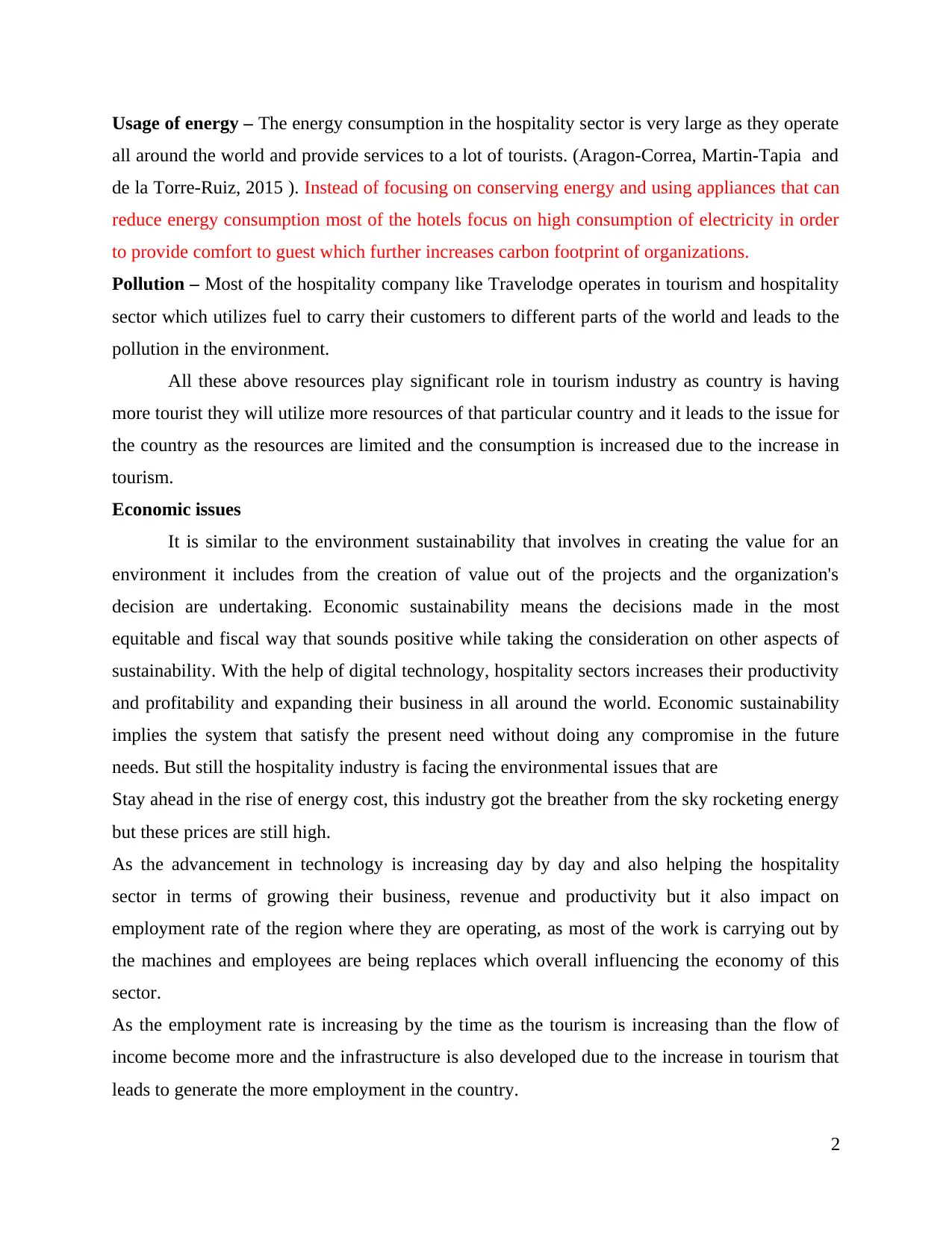
Usage of energy – The energy consumption in the hospitality sector is very large as they operate
all around the world and provide services to a lot of tourists. (Aragon-Correa, Martin-Tapia and
de la Torre-Ruiz, 2015 ). Instead of focusing on conserving energy and using appliances that can
reduce energy consumption most of the hotels focus on high consumption of electricity in order
to provide comfort to guest which further increases carbon footprint of organizations.
Pollution – Most of the hospitality company like Travelodge operates in tourism and hospitality
sector which utilizes fuel to carry their customers to different parts of the world and leads to the
pollution in the environment.
All these above resources play significant role in tourism industry as country is having
more tourist they will utilize more resources of that particular country and it leads to the issue for
the country as the resources are limited and the consumption is increased due to the increase in
tourism.
Economic issues
It is similar to the environment sustainability that involves in creating the value for an
environment it includes from the creation of value out of the projects and the organization's
decision are undertaking. Economic sustainability means the decisions made in the most
equitable and fiscal way that sounds positive while taking the consideration on other aspects of
sustainability. With the help of digital technology, hospitality sectors increases their productivity
and profitability and expanding their business in all around the world. Economic sustainability
implies the system that satisfy the present need without doing any compromise in the future
needs. But still the hospitality industry is facing the environmental issues that are
Stay ahead in the rise of energy cost, this industry got the breather from the sky rocketing energy
but these prices are still high.
As the advancement in technology is increasing day by day and also helping the hospitality
sector in terms of growing their business, revenue and productivity but it also impact on
employment rate of the region where they are operating, as most of the work is carrying out by
the machines and employees are being replaces which overall influencing the economy of this
sector.
As the employment rate is increasing by the time as the tourism is increasing than the flow of
income become more and the infrastructure is also developed due to the increase in tourism that
leads to generate the more employment in the country.
2
all around the world and provide services to a lot of tourists. (Aragon-Correa, Martin-Tapia and
de la Torre-Ruiz, 2015 ). Instead of focusing on conserving energy and using appliances that can
reduce energy consumption most of the hotels focus on high consumption of electricity in order
to provide comfort to guest which further increases carbon footprint of organizations.
Pollution – Most of the hospitality company like Travelodge operates in tourism and hospitality
sector which utilizes fuel to carry their customers to different parts of the world and leads to the
pollution in the environment.
All these above resources play significant role in tourism industry as country is having
more tourist they will utilize more resources of that particular country and it leads to the issue for
the country as the resources are limited and the consumption is increased due to the increase in
tourism.
Economic issues
It is similar to the environment sustainability that involves in creating the value for an
environment it includes from the creation of value out of the projects and the organization's
decision are undertaking. Economic sustainability means the decisions made in the most
equitable and fiscal way that sounds positive while taking the consideration on other aspects of
sustainability. With the help of digital technology, hospitality sectors increases their productivity
and profitability and expanding their business in all around the world. Economic sustainability
implies the system that satisfy the present need without doing any compromise in the future
needs. But still the hospitality industry is facing the environmental issues that are
Stay ahead in the rise of energy cost, this industry got the breather from the sky rocketing energy
but these prices are still high.
As the advancement in technology is increasing day by day and also helping the hospitality
sector in terms of growing their business, revenue and productivity but it also impact on
employment rate of the region where they are operating, as most of the work is carrying out by
the machines and employees are being replaces which overall influencing the economy of this
sector.
As the employment rate is increasing by the time as the tourism is increasing than the flow of
income become more and the infrastructure is also developed due to the increase in tourism that
leads to generate the more employment in the country.
2
Paraphrase This Document
Need a fresh take? Get an instant paraphrase of this document with our AI Paraphraser
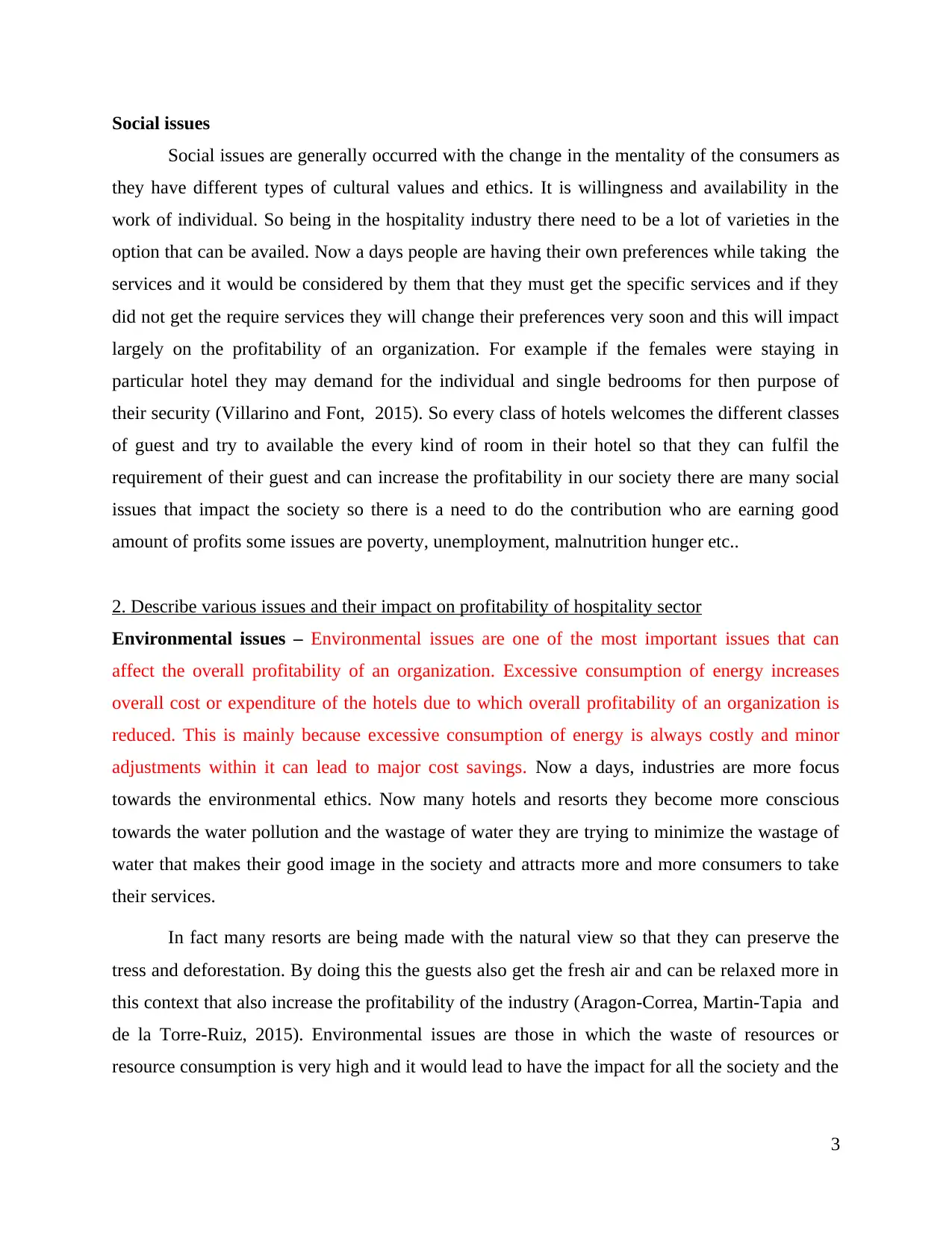
Social issues
Social issues are generally occurred with the change in the mentality of the consumers as
they have different types of cultural values and ethics. It is willingness and availability in the
work of individual. So being in the hospitality industry there need to be a lot of varieties in the
option that can be availed. Now a days people are having their own preferences while taking the
services and it would be considered by them that they must get the specific services and if they
did not get the require services they will change their preferences very soon and this will impact
largely on the profitability of an organization. For example if the females were staying in
particular hotel they may demand for the individual and single bedrooms for then purpose of
their security (Villarino and Font, 2015). So every class of hotels welcomes the different classes
of guest and try to available the every kind of room in their hotel so that they can fulfil the
requirement of their guest and can increase the profitability in our society there are many social
issues that impact the society so there is a need to do the contribution who are earning good
amount of profits some issues are poverty, unemployment, malnutrition hunger etc..
2. Describe various issues and their impact on profitability of hospitality sector
Environmental issues – Environmental issues are one of the most important issues that can
affect the overall profitability of an organization. Excessive consumption of energy increases
overall cost or expenditure of the hotels due to which overall profitability of an organization is
reduced. This is mainly because excessive consumption of energy is always costly and minor
adjustments within it can lead to major cost savings. Now a days, industries are more focus
towards the environmental ethics. Now many hotels and resorts they become more conscious
towards the water pollution and the wastage of water they are trying to minimize the wastage of
water that makes their good image in the society and attracts more and more consumers to take
their services.
In fact many resorts are being made with the natural view so that they can preserve the
tress and deforestation. By doing this the guests also get the fresh air and can be relaxed more in
this context that also increase the profitability of the industry (Aragon-Correa, Martin-Tapia and
de la Torre-Ruiz, 2015). Environmental issues are those in which the waste of resources or
resource consumption is very high and it would lead to have the impact for all the society and the
3
Social issues are generally occurred with the change in the mentality of the consumers as
they have different types of cultural values and ethics. It is willingness and availability in the
work of individual. So being in the hospitality industry there need to be a lot of varieties in the
option that can be availed. Now a days people are having their own preferences while taking the
services and it would be considered by them that they must get the specific services and if they
did not get the require services they will change their preferences very soon and this will impact
largely on the profitability of an organization. For example if the females were staying in
particular hotel they may demand for the individual and single bedrooms for then purpose of
their security (Villarino and Font, 2015). So every class of hotels welcomes the different classes
of guest and try to available the every kind of room in their hotel so that they can fulfil the
requirement of their guest and can increase the profitability in our society there are many social
issues that impact the society so there is a need to do the contribution who are earning good
amount of profits some issues are poverty, unemployment, malnutrition hunger etc..
2. Describe various issues and their impact on profitability of hospitality sector
Environmental issues – Environmental issues are one of the most important issues that can
affect the overall profitability of an organization. Excessive consumption of energy increases
overall cost or expenditure of the hotels due to which overall profitability of an organization is
reduced. This is mainly because excessive consumption of energy is always costly and minor
adjustments within it can lead to major cost savings. Now a days, industries are more focus
towards the environmental ethics. Now many hotels and resorts they become more conscious
towards the water pollution and the wastage of water they are trying to minimize the wastage of
water that makes their good image in the society and attracts more and more consumers to take
their services.
In fact many resorts are being made with the natural view so that they can preserve the
tress and deforestation. By doing this the guests also get the fresh air and can be relaxed more in
this context that also increase the profitability of the industry (Aragon-Correa, Martin-Tapia and
de la Torre-Ruiz, 2015). Environmental issues are those in which the waste of resources or
resource consumption is very high and it would lead to have the impact for all the society and the
3
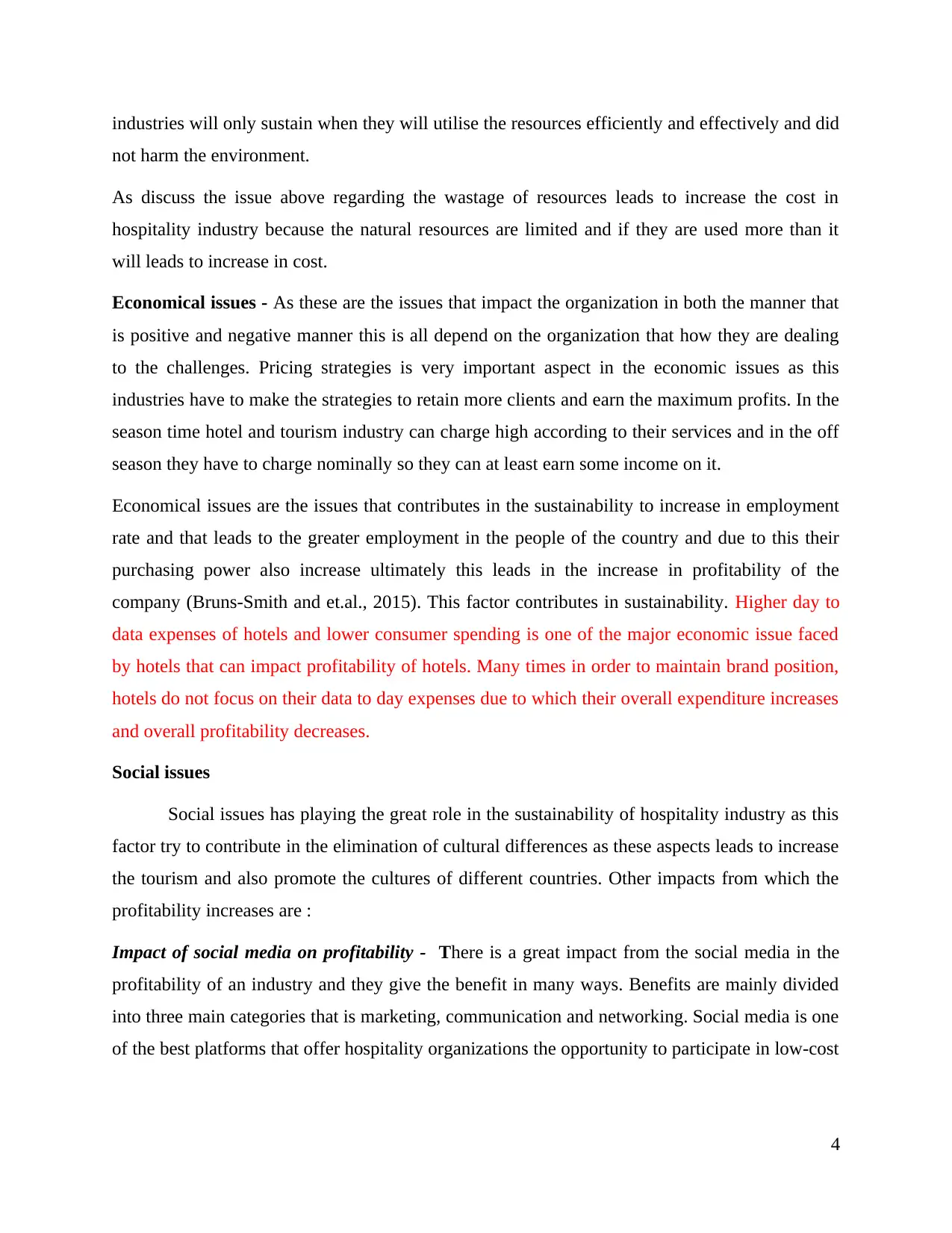
industries will only sustain when they will utilise the resources efficiently and effectively and did
not harm the environment.
As discuss the issue above regarding the wastage of resources leads to increase the cost in
hospitality industry because the natural resources are limited and if they are used more than it
will leads to increase in cost.
Economical issues - As these are the issues that impact the organization in both the manner that
is positive and negative manner this is all depend on the organization that how they are dealing
to the challenges. Pricing strategies is very important aspect in the economic issues as this
industries have to make the strategies to retain more clients and earn the maximum profits. In the
season time hotel and tourism industry can charge high according to their services and in the off
season they have to charge nominally so they can at least earn some income on it.
Economical issues are the issues that contributes in the sustainability to increase in employment
rate and that leads to the greater employment in the people of the country and due to this their
purchasing power also increase ultimately this leads in the increase in profitability of the
company (Bruns-Smith and et.al., 2015). This factor contributes in sustainability. Higher day to
data expenses of hotels and lower consumer spending is one of the major economic issue faced
by hotels that can impact profitability of hotels. Many times in order to maintain brand position,
hotels do not focus on their data to day expenses due to which their overall expenditure increases
and overall profitability decreases.
Social issues
Social issues has playing the great role in the sustainability of hospitality industry as this
factor try to contribute in the elimination of cultural differences as these aspects leads to increase
the tourism and also promote the cultures of different countries. Other impacts from which the
profitability increases are :
Impact of social media on profitability - There is a great impact from the social media in the
profitability of an industry and they give the benefit in many ways. Benefits are mainly divided
into three main categories that is marketing, communication and networking. Social media is one
of the best platforms that offer hospitality organizations the opportunity to participate in low-cost
4
not harm the environment.
As discuss the issue above regarding the wastage of resources leads to increase the cost in
hospitality industry because the natural resources are limited and if they are used more than it
will leads to increase in cost.
Economical issues - As these are the issues that impact the organization in both the manner that
is positive and negative manner this is all depend on the organization that how they are dealing
to the challenges. Pricing strategies is very important aspect in the economic issues as this
industries have to make the strategies to retain more clients and earn the maximum profits. In the
season time hotel and tourism industry can charge high according to their services and in the off
season they have to charge nominally so they can at least earn some income on it.
Economical issues are the issues that contributes in the sustainability to increase in employment
rate and that leads to the greater employment in the people of the country and due to this their
purchasing power also increase ultimately this leads in the increase in profitability of the
company (Bruns-Smith and et.al., 2015). This factor contributes in sustainability. Higher day to
data expenses of hotels and lower consumer spending is one of the major economic issue faced
by hotels that can impact profitability of hotels. Many times in order to maintain brand position,
hotels do not focus on their data to day expenses due to which their overall expenditure increases
and overall profitability decreases.
Social issues
Social issues has playing the great role in the sustainability of hospitality industry as this
factor try to contribute in the elimination of cultural differences as these aspects leads to increase
the tourism and also promote the cultures of different countries. Other impacts from which the
profitability increases are :
Impact of social media on profitability - There is a great impact from the social media in the
profitability of an industry and they give the benefit in many ways. Benefits are mainly divided
into three main categories that is marketing, communication and networking. Social media is one
of the best platforms that offer hospitality organizations the opportunity to participate in low-cost
4
⊘ This is a preview!⊘
Do you want full access?
Subscribe today to unlock all pages.

Trusted by 1+ million students worldwide
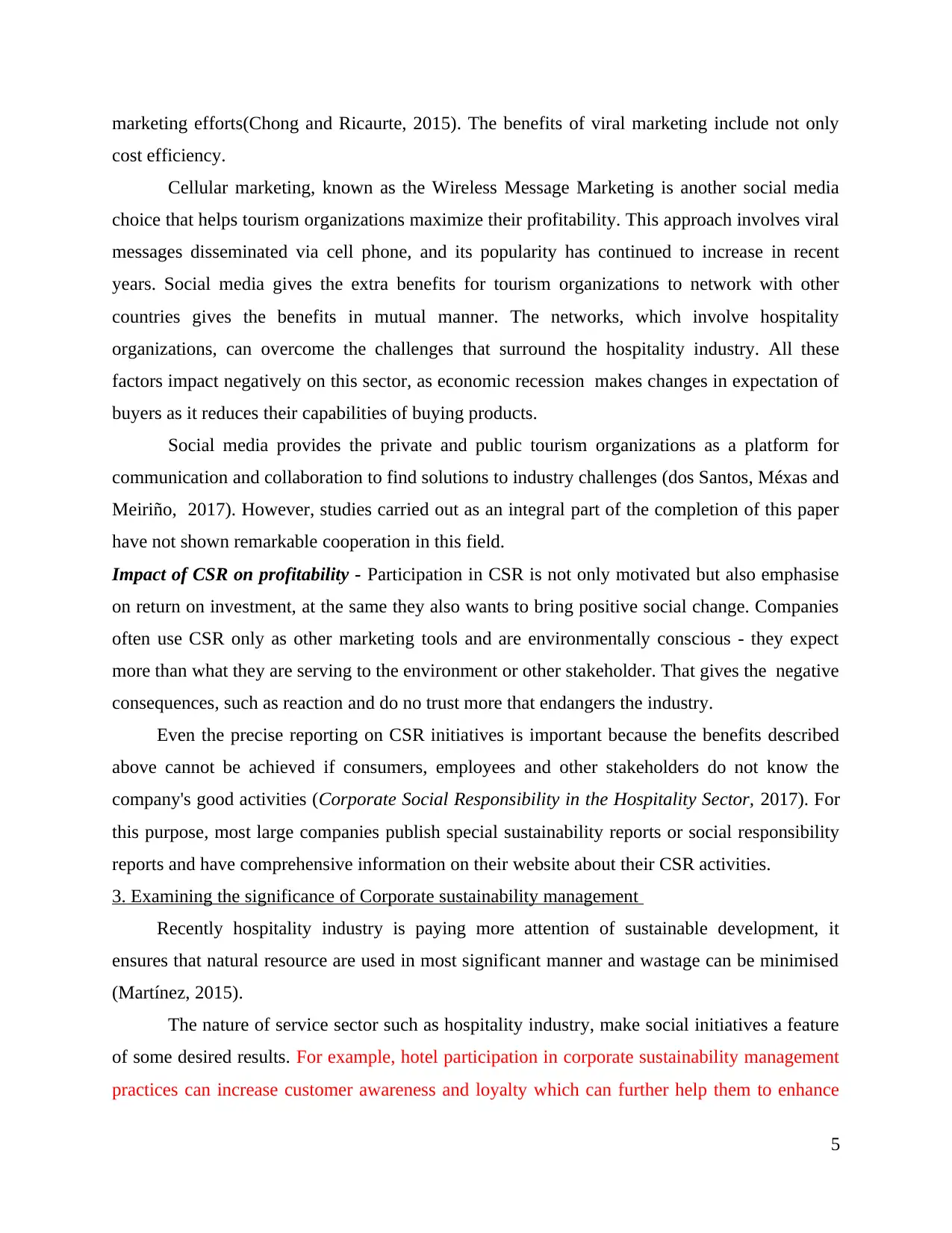
marketing efforts(Chong and Ricaurte, 2015). The benefits of viral marketing include not only
cost efficiency.
Cellular marketing, known as the Wireless Message Marketing is another social media
choice that helps tourism organizations maximize their profitability. This approach involves viral
messages disseminated via cell phone, and its popularity has continued to increase in recent
years. Social media gives the extra benefits for tourism organizations to network with other
countries gives the benefits in mutual manner. The networks, which involve hospitality
organizations, can overcome the challenges that surround the hospitality industry. All these
factors impact negatively on this sector, as economic recession makes changes in expectation of
buyers as it reduces their capabilities of buying products.
Social media provides the private and public tourism organizations as a platform for
communication and collaboration to find solutions to industry challenges (dos Santos, Méxas and
Meiriño, 2017). However, studies carried out as an integral part of the completion of this paper
have not shown remarkable cooperation in this field.
Impact of CSR on profitability - Participation in CSR is not only motivated but also emphasise
on return on investment, at the same they also wants to bring positive social change. Companies
often use CSR only as other marketing tools and are environmentally conscious - they expect
more than what they are serving to the environment or other stakeholder. That gives the negative
consequences, such as reaction and do no trust more that endangers the industry.
Even the precise reporting on CSR initiatives is important because the benefits described
above cannot be achieved if consumers, employees and other stakeholders do not know the
company's good activities (Corporate Social Responsibility in the Hospitality Sector, 2017). For
this purpose, most large companies publish special sustainability reports or social responsibility
reports and have comprehensive information on their website about their CSR activities.
3. Examining the significance of Corporate sustainability management
Recently hospitality industry is paying more attention of sustainable development, it
ensures that natural resource are used in most significant manner and wastage can be minimised
(Martínez, 2015).
The nature of service sector such as hospitality industry, make social initiatives a feature
of some desired results. For example, hotel participation in corporate sustainability management
practices can increase customer awareness and loyalty which can further help them to enhance
5
cost efficiency.
Cellular marketing, known as the Wireless Message Marketing is another social media
choice that helps tourism organizations maximize their profitability. This approach involves viral
messages disseminated via cell phone, and its popularity has continued to increase in recent
years. Social media gives the extra benefits for tourism organizations to network with other
countries gives the benefits in mutual manner. The networks, which involve hospitality
organizations, can overcome the challenges that surround the hospitality industry. All these
factors impact negatively on this sector, as economic recession makes changes in expectation of
buyers as it reduces their capabilities of buying products.
Social media provides the private and public tourism organizations as a platform for
communication and collaboration to find solutions to industry challenges (dos Santos, Méxas and
Meiriño, 2017). However, studies carried out as an integral part of the completion of this paper
have not shown remarkable cooperation in this field.
Impact of CSR on profitability - Participation in CSR is not only motivated but also emphasise
on return on investment, at the same they also wants to bring positive social change. Companies
often use CSR only as other marketing tools and are environmentally conscious - they expect
more than what they are serving to the environment or other stakeholder. That gives the negative
consequences, such as reaction and do no trust more that endangers the industry.
Even the precise reporting on CSR initiatives is important because the benefits described
above cannot be achieved if consumers, employees and other stakeholders do not know the
company's good activities (Corporate Social Responsibility in the Hospitality Sector, 2017). For
this purpose, most large companies publish special sustainability reports or social responsibility
reports and have comprehensive information on their website about their CSR activities.
3. Examining the significance of Corporate sustainability management
Recently hospitality industry is paying more attention of sustainable development, it
ensures that natural resource are used in most significant manner and wastage can be minimised
(Martínez, 2015).
The nature of service sector such as hospitality industry, make social initiatives a feature
of some desired results. For example, hotel participation in corporate sustainability management
practices can increase customer awareness and loyalty which can further help them to enhance
5
Paraphrase This Document
Need a fresh take? Get an instant paraphrase of this document with our AI Paraphraser
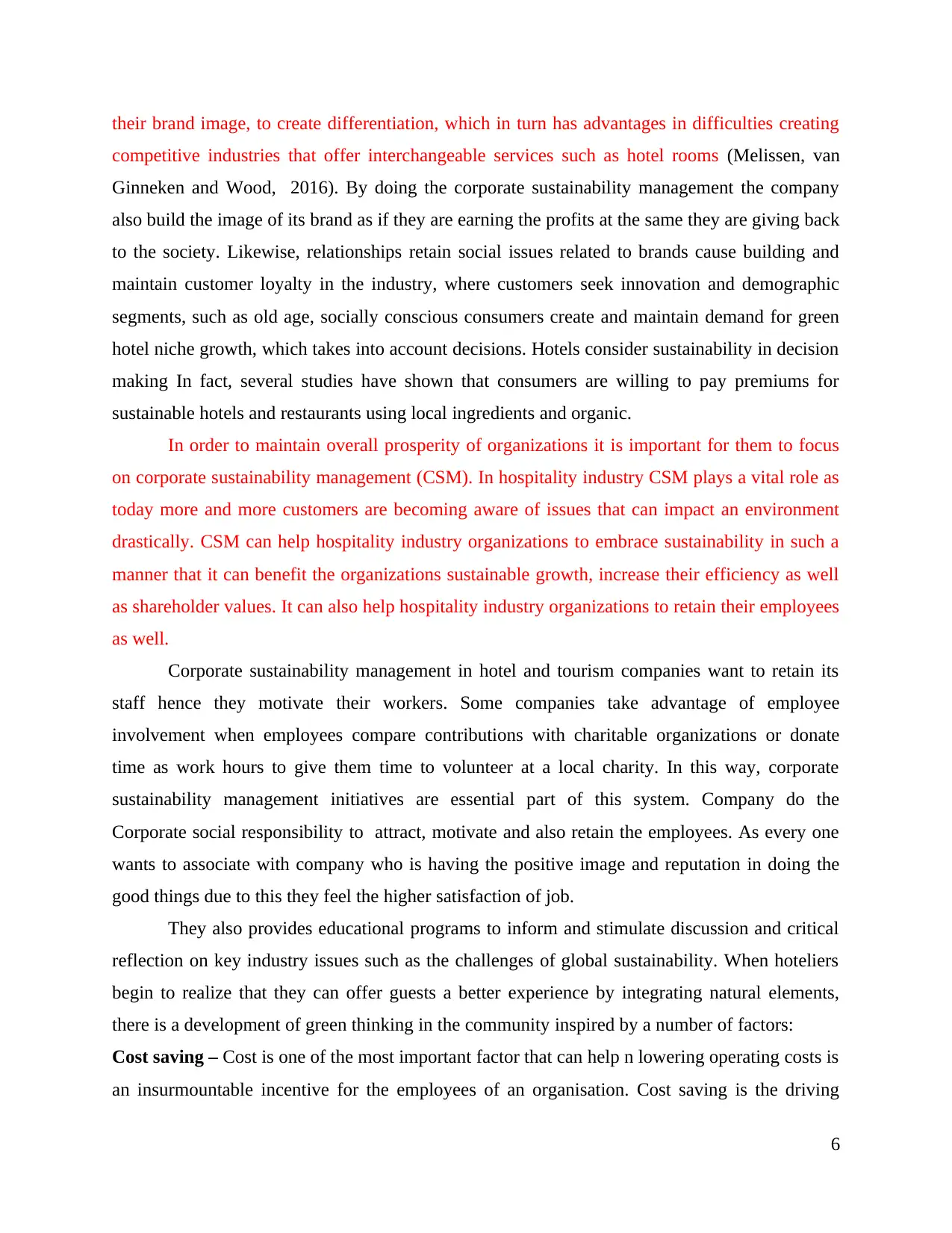
their brand image, to create differentiation, which in turn has advantages in difficulties creating
competitive industries that offer interchangeable services such as hotel rooms (Melissen, van
Ginneken and Wood, 2016). By doing the corporate sustainability management the company
also build the image of its brand as if they are earning the profits at the same they are giving back
to the society. Likewise, relationships retain social issues related to brands cause building and
maintain customer loyalty in the industry, where customers seek innovation and demographic
segments, such as old age, socially conscious consumers create and maintain demand for green
hotel niche growth, which takes into account decisions. Hotels consider sustainability in decision
making In fact, several studies have shown that consumers are willing to pay premiums for
sustainable hotels and restaurants using local ingredients and organic.
In order to maintain overall prosperity of organizations it is important for them to focus
on corporate sustainability management (CSM). In hospitality industry CSM plays a vital role as
today more and more customers are becoming aware of issues that can impact an environment
drastically. CSM can help hospitality industry organizations to embrace sustainability in such a
manner that it can benefit the organizations sustainable growth, increase their efficiency as well
as shareholder values. It can also help hospitality industry organizations to retain their employees
as well.
Corporate sustainability management in hotel and tourism companies want to retain its
staff hence they motivate their workers. Some companies take advantage of employee
involvement when employees compare contributions with charitable organizations or donate
time as work hours to give them time to volunteer at a local charity. In this way, corporate
sustainability management initiatives are essential part of this system. Company do the
Corporate social responsibility to attract, motivate and also retain the employees. As every one
wants to associate with company who is having the positive image and reputation in doing the
good things due to this they feel the higher satisfaction of job.
They also provides educational programs to inform and stimulate discussion and critical
reflection on key industry issues such as the challenges of global sustainability. When hoteliers
begin to realize that they can offer guests a better experience by integrating natural elements,
there is a development of green thinking in the community inspired by a number of factors:
Cost saving – Cost is one of the most important factor that can help n lowering operating costs is
an insurmountable incentive for the employees of an organisation. Cost saving is the driving
6
competitive industries that offer interchangeable services such as hotel rooms (Melissen, van
Ginneken and Wood, 2016). By doing the corporate sustainability management the company
also build the image of its brand as if they are earning the profits at the same they are giving back
to the society. Likewise, relationships retain social issues related to brands cause building and
maintain customer loyalty in the industry, where customers seek innovation and demographic
segments, such as old age, socially conscious consumers create and maintain demand for green
hotel niche growth, which takes into account decisions. Hotels consider sustainability in decision
making In fact, several studies have shown that consumers are willing to pay premiums for
sustainable hotels and restaurants using local ingredients and organic.
In order to maintain overall prosperity of organizations it is important for them to focus
on corporate sustainability management (CSM). In hospitality industry CSM plays a vital role as
today more and more customers are becoming aware of issues that can impact an environment
drastically. CSM can help hospitality industry organizations to embrace sustainability in such a
manner that it can benefit the organizations sustainable growth, increase their efficiency as well
as shareholder values. It can also help hospitality industry organizations to retain their employees
as well.
Corporate sustainability management in hotel and tourism companies want to retain its
staff hence they motivate their workers. Some companies take advantage of employee
involvement when employees compare contributions with charitable organizations or donate
time as work hours to give them time to volunteer at a local charity. In this way, corporate
sustainability management initiatives are essential part of this system. Company do the
Corporate social responsibility to attract, motivate and also retain the employees. As every one
wants to associate with company who is having the positive image and reputation in doing the
good things due to this they feel the higher satisfaction of job.
They also provides educational programs to inform and stimulate discussion and critical
reflection on key industry issues such as the challenges of global sustainability. When hoteliers
begin to realize that they can offer guests a better experience by integrating natural elements,
there is a development of green thinking in the community inspired by a number of factors:
Cost saving – Cost is one of the most important factor that can help n lowering operating costs is
an insurmountable incentive for the employees of an organisation. Cost saving is the driving
6
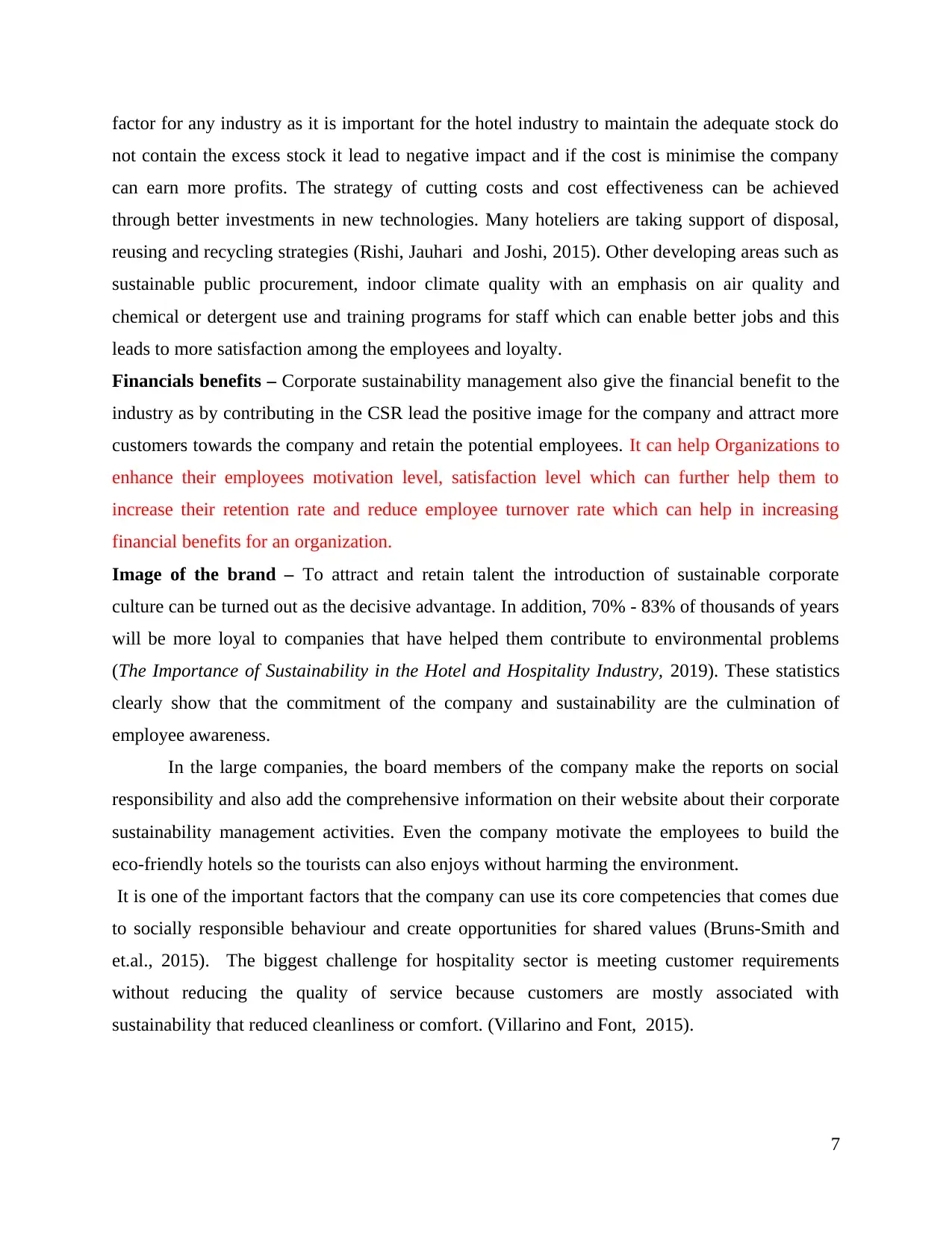
factor for any industry as it is important for the hotel industry to maintain the adequate stock do
not contain the excess stock it lead to negative impact and if the cost is minimise the company
can earn more profits. The strategy of cutting costs and cost effectiveness can be achieved
through better investments in new technologies. Many hoteliers are taking support of disposal,
reusing and recycling strategies (Rishi, Jauhari and Joshi, 2015). Other developing areas such as
sustainable public procurement, indoor climate quality with an emphasis on air quality and
chemical or detergent use and training programs for staff which can enable better jobs and this
leads to more satisfaction among the employees and loyalty.
Financials benefits – Corporate sustainability management also give the financial benefit to the
industry as by contributing in the CSR lead the positive image for the company and attract more
customers towards the company and retain the potential employees. It can help Organizations to
enhance their employees motivation level, satisfaction level which can further help them to
increase their retention rate and reduce employee turnover rate which can help in increasing
financial benefits for an organization.
Image of the brand – To attract and retain talent the introduction of sustainable corporate
culture can be turned out as the decisive advantage. In addition, 70% - 83% of thousands of years
will be more loyal to companies that have helped them contribute to environmental problems
(The Importance of Sustainability in the Hotel and Hospitality Industry, 2019). These statistics
clearly show that the commitment of the company and sustainability are the culmination of
employee awareness.
In the large companies, the board members of the company make the reports on social
responsibility and also add the comprehensive information on their website about their corporate
sustainability management activities. Even the company motivate the employees to build the
eco-friendly hotels so the tourists can also enjoys without harming the environment.
It is one of the important factors that the company can use its core competencies that comes due
to socially responsible behaviour and create opportunities for shared values (Bruns-Smith and
et.al., 2015). The biggest challenge for hospitality sector is meeting customer requirements
without reducing the quality of service because customers are mostly associated with
sustainability that reduced cleanliness or comfort. (Villarino and Font, 2015).
7
not contain the excess stock it lead to negative impact and if the cost is minimise the company
can earn more profits. The strategy of cutting costs and cost effectiveness can be achieved
through better investments in new technologies. Many hoteliers are taking support of disposal,
reusing and recycling strategies (Rishi, Jauhari and Joshi, 2015). Other developing areas such as
sustainable public procurement, indoor climate quality with an emphasis on air quality and
chemical or detergent use and training programs for staff which can enable better jobs and this
leads to more satisfaction among the employees and loyalty.
Financials benefits – Corporate sustainability management also give the financial benefit to the
industry as by contributing in the CSR lead the positive image for the company and attract more
customers towards the company and retain the potential employees. It can help Organizations to
enhance their employees motivation level, satisfaction level which can further help them to
increase their retention rate and reduce employee turnover rate which can help in increasing
financial benefits for an organization.
Image of the brand – To attract and retain talent the introduction of sustainable corporate
culture can be turned out as the decisive advantage. In addition, 70% - 83% of thousands of years
will be more loyal to companies that have helped them contribute to environmental problems
(The Importance of Sustainability in the Hotel and Hospitality Industry, 2019). These statistics
clearly show that the commitment of the company and sustainability are the culmination of
employee awareness.
In the large companies, the board members of the company make the reports on social
responsibility and also add the comprehensive information on their website about their corporate
sustainability management activities. Even the company motivate the employees to build the
eco-friendly hotels so the tourists can also enjoys without harming the environment.
It is one of the important factors that the company can use its core competencies that comes due
to socially responsible behaviour and create opportunities for shared values (Bruns-Smith and
et.al., 2015). The biggest challenge for hospitality sector is meeting customer requirements
without reducing the quality of service because customers are mostly associated with
sustainability that reduced cleanliness or comfort. (Villarino and Font, 2015).
7
⊘ This is a preview!⊘
Do you want full access?
Subscribe today to unlock all pages.

Trusted by 1+ million students worldwide
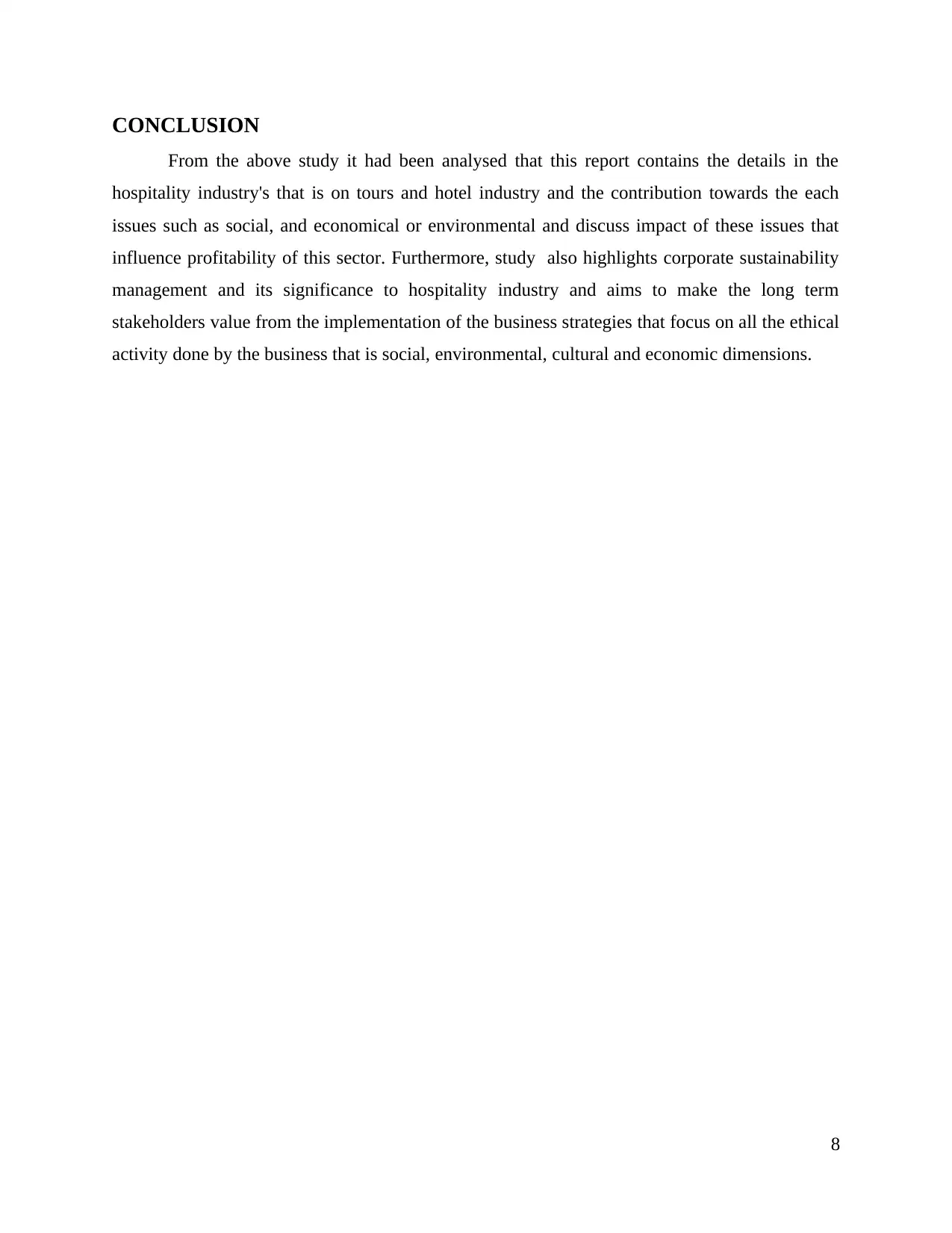
CONCLUSION
From the above study it had been analysed that this report contains the details in the
hospitality industry's that is on tours and hotel industry and the contribution towards the each
issues such as social, and economical or environmental and discuss impact of these issues that
influence profitability of this sector. Furthermore, study also highlights corporate sustainability
management and its significance to hospitality industry and aims to make the long term
stakeholders value from the implementation of the business strategies that focus on all the ethical
activity done by the business that is social, environmental, cultural and economic dimensions.
8
From the above study it had been analysed that this report contains the details in the
hospitality industry's that is on tours and hotel industry and the contribution towards the each
issues such as social, and economical or environmental and discuss impact of these issues that
influence profitability of this sector. Furthermore, study also highlights corporate sustainability
management and its significance to hospitality industry and aims to make the long term
stakeholders value from the implementation of the business strategies that focus on all the ethical
activity done by the business that is social, environmental, cultural and economic dimensions.
8
Paraphrase This Document
Need a fresh take? Get an instant paraphrase of this document with our AI Paraphraser
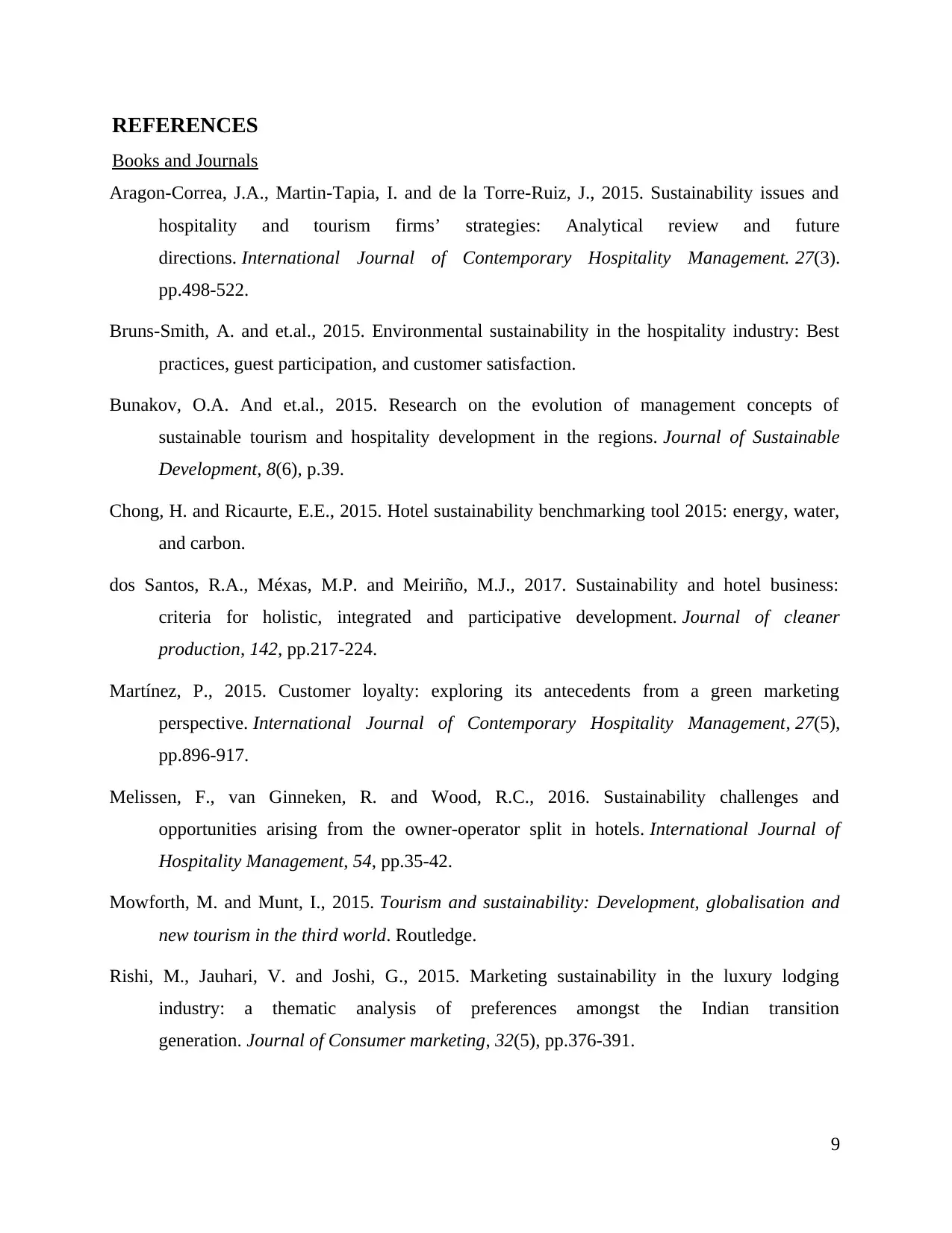
REFERENCES
Books and Journals
Aragon-Correa, J.A., Martin-Tapia, I. and de la Torre-Ruiz, J., 2015. Sustainability issues and
hospitality and tourism firms’ strategies: Analytical review and future
directions. International Journal of Contemporary Hospitality Management. 27(3).
pp.498-522.
Bruns-Smith, A. and et.al., 2015. Environmental sustainability in the hospitality industry: Best
practices, guest participation, and customer satisfaction.
Bunakov, O.A. And et.al., 2015. Research on the evolution of management concepts of
sustainable tourism and hospitality development in the regions. Journal of Sustainable
Development, 8(6), p.39.
Chong, H. and Ricaurte, E.E., 2015. Hotel sustainability benchmarking tool 2015: energy, water,
and carbon.
dos Santos, R.A., Méxas, M.P. and Meiriño, M.J., 2017. Sustainability and hotel business:
criteria for holistic, integrated and participative development. Journal of cleaner
production, 142, pp.217-224.
Martínez, P., 2015. Customer loyalty: exploring its antecedents from a green marketing
perspective. International Journal of Contemporary Hospitality Management, 27(5),
pp.896-917.
Melissen, F., van Ginneken, R. and Wood, R.C., 2016. Sustainability challenges and
opportunities arising from the owner-operator split in hotels. International Journal of
Hospitality Management, 54, pp.35-42.
Mowforth, M. and Munt, I., 2015. Tourism and sustainability: Development, globalisation and
new tourism in the third world. Routledge.
Rishi, M., Jauhari, V. and Joshi, G., 2015. Marketing sustainability in the luxury lodging
industry: a thematic analysis of preferences amongst the Indian transition
generation. Journal of Consumer marketing, 32(5), pp.376-391.
9
Books and Journals
Aragon-Correa, J.A., Martin-Tapia, I. and de la Torre-Ruiz, J., 2015. Sustainability issues and
hospitality and tourism firms’ strategies: Analytical review and future
directions. International Journal of Contemporary Hospitality Management. 27(3).
pp.498-522.
Bruns-Smith, A. and et.al., 2015. Environmental sustainability in the hospitality industry: Best
practices, guest participation, and customer satisfaction.
Bunakov, O.A. And et.al., 2015. Research on the evolution of management concepts of
sustainable tourism and hospitality development in the regions. Journal of Sustainable
Development, 8(6), p.39.
Chong, H. and Ricaurte, E.E., 2015. Hotel sustainability benchmarking tool 2015: energy, water,
and carbon.
dos Santos, R.A., Méxas, M.P. and Meiriño, M.J., 2017. Sustainability and hotel business:
criteria for holistic, integrated and participative development. Journal of cleaner
production, 142, pp.217-224.
Martínez, P., 2015. Customer loyalty: exploring its antecedents from a green marketing
perspective. International Journal of Contemporary Hospitality Management, 27(5),
pp.896-917.
Melissen, F., van Ginneken, R. and Wood, R.C., 2016. Sustainability challenges and
opportunities arising from the owner-operator split in hotels. International Journal of
Hospitality Management, 54, pp.35-42.
Mowforth, M. and Munt, I., 2015. Tourism and sustainability: Development, globalisation and
new tourism in the third world. Routledge.
Rishi, M., Jauhari, V. and Joshi, G., 2015. Marketing sustainability in the luxury lodging
industry: a thematic analysis of preferences amongst the Indian transition
generation. Journal of Consumer marketing, 32(5), pp.376-391.
9
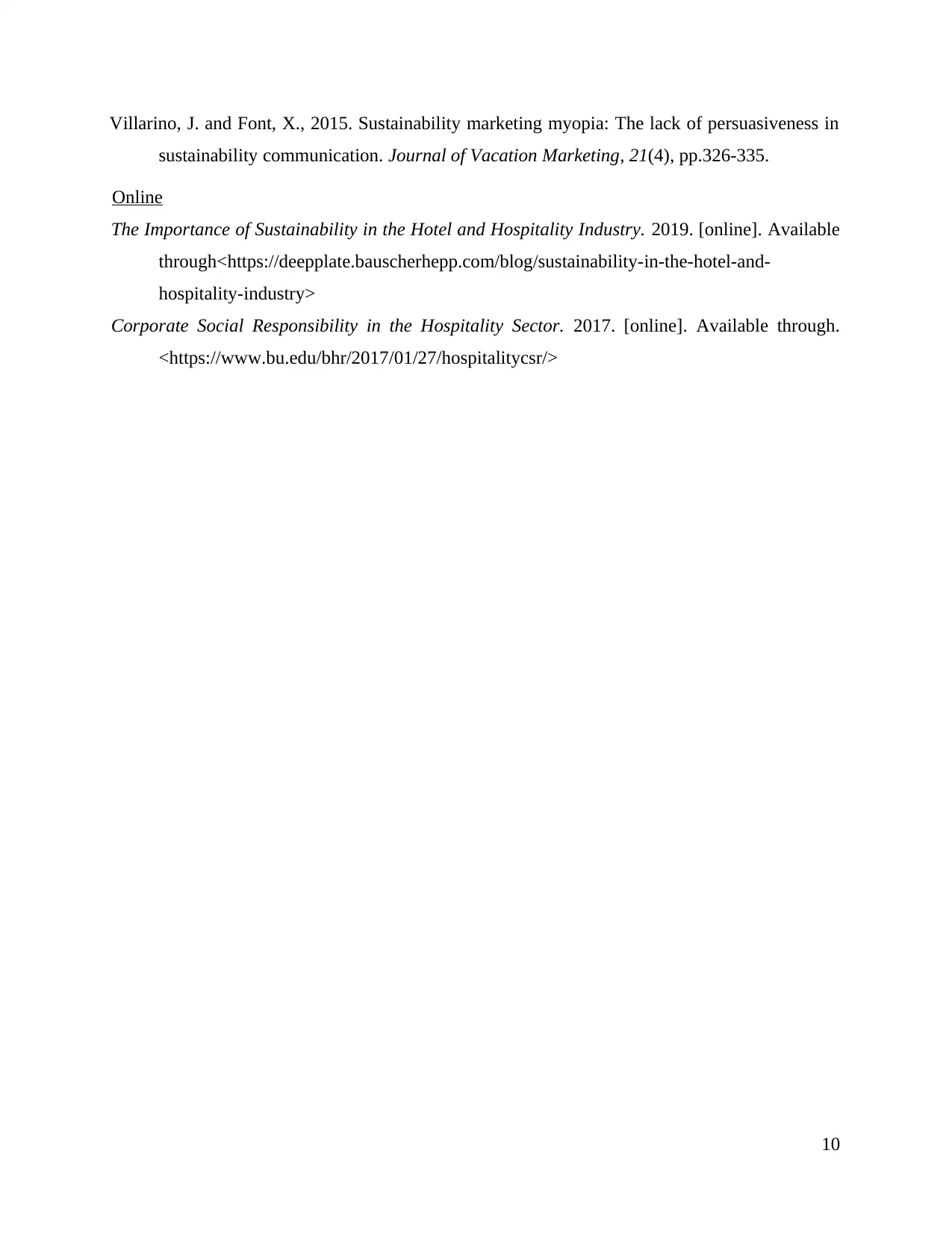
Villarino, J. and Font, X., 2015. Sustainability marketing myopia: The lack of persuasiveness in
sustainability communication. Journal of Vacation Marketing, 21(4), pp.326-335.
Online
The Importance of Sustainability in the Hotel and Hospitality Industry. 2019. [online]. Available
through<https://deepplate.bauscherhepp.com/blog/sustainability-in-the-hotel-and-
hospitality-industry>
Corporate Social Responsibility in the Hospitality Sector. 2017. [online]. Available through.
<https://www.bu.edu/bhr/2017/01/27/hospitalitycsr/>
10
sustainability communication. Journal of Vacation Marketing, 21(4), pp.326-335.
Online
The Importance of Sustainability in the Hotel and Hospitality Industry. 2019. [online]. Available
through<https://deepplate.bauscherhepp.com/blog/sustainability-in-the-hotel-and-
hospitality-industry>
Corporate Social Responsibility in the Hospitality Sector. 2017. [online]. Available through.
<https://www.bu.edu/bhr/2017/01/27/hospitalitycsr/>
10
⊘ This is a preview!⊘
Do you want full access?
Subscribe today to unlock all pages.

Trusted by 1+ million students worldwide
1 out of 12
Related Documents
Your All-in-One AI-Powered Toolkit for Academic Success.
+13062052269
info@desklib.com
Available 24*7 on WhatsApp / Email
![[object Object]](/_next/static/media/star-bottom.7253800d.svg)
Unlock your academic potential
Copyright © 2020–2026 A2Z Services. All Rights Reserved. Developed and managed by ZUCOL.





